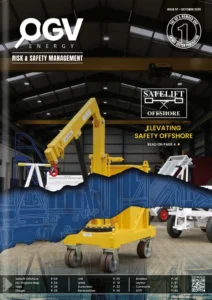North Sea industry uncertain on coronavirus procedures, helicopter flights
CREDIT: S&P Global.
The UK’s North Sea oil and gas industry still has unresolved questions over what to do in the event of offshore workers developing coronavirus, with particular issues relating to helicopter providers refusing to transport infected workers or fly to facilities that have had a case of coronavirus, a senior figure at the industry body Oil & Gas UK said Thursday.
In a briefing with journalists, OGUK health and safety director Trevor Stapleton said problems were already emerging in sourcing vital equipment such as valves from Italy, due to a nationwide shutdown there to combat coronavirus. He said non-critical maintenance could be delayed in the coming months until next year.
Stapleton said cases of infection would not necessarily mean production facilities having to shut down, but noted there were certain roles critical to the operation of oil and gas facilities, and contingency planning was underway throughout the industry. OGUK is holding weekly meetings on the issue with regulator the Oil & Gas Authority and the government’s Department for Business, Energy and Industrial Strategy, he said.
The UK produces over 1 million b/d of crude oil and meets a substantial proportion of its gas needs from the North Sea.
So far, Norway’s oil and gas industry has confirmed its first case of coronavirus in an offshore worker, while in the UK industry, a suspected case was announced on Wednesday at the Mariner field.
Stapleton noted a particular issue with helicopter flights to and from offshore oil and gas facilities, which are generally relied on for transporting sick workers, and for regular changes of the “crew” that run such facilities. But he said OGUK was hopeful of negotiating new arrangements to allow transportation of workers infected with coronavirus. Offshore facilities always have qualified medics and emergency rescue flights are available for life-threatening situations, he added.
“If we do have a confirmed case, at the moment the helicopter operators won’t from a commercial transport point of view go to that affected installation. We think we’re close to getting a solution such that we could remove someone that has been confirmed back on shore for appropriate treatment,” Stapleton said.
“That still doesn’t address the situation of so now we have a platform that has had a confirmed case,” he said, adding talks were underway with the Scottish health authority on what to do once an installation has had a confirmed case of coronavirus.
“We’re working hard with Health Protection Scotland to develop a protocol…We’re waiting for them to develop a protocol,” he said.
Stapleton said that without flights offshore, installations could continue operating for a period, provided critical personnel remained healthy, such as the installation manager or their deputies, but also roles such as crane operators needed to lift supplies brought by marine vessels. “The crews that would be offshore at the time would carry on working. Installations would still be able to continue to operate,” he said.
Maintenance delays likely
On the issue of maintenance, Stapleton said there could well be delays, and problems were already emerging with supplies from Italy. The UK’s Forties pipeline system, a crucial oil transportation artery, is currently due for a major three-week shutdown for upgrade work from June 16.
“There are some problems already,” Stapleton said. “A lot of equipment is coming from Italy, valves and things. It’s recognised that this could be an issue, so that’s being looked at as of today going forward, and working with the operators and the likes of Forties Pipeline System as well, to say what is clearly essential activities that we need to do, and maybe what are some of the things now that we could postpone to next year.”
Stapleton added that the industry was stepping up controls on who is allowed to travel offshore based on their recent travel, and was looking at whether the industry could arrange preferential processing of coronavirus test results on the grounds of it being classified as critical infrastructure. He said the regulator, the Oil & Gas Authority, was also looking to safeguard critical onshore installations such as processing plants and terminals.
Source: https://www.spglobal.com/platts/en/market-insights/latest-news/natural-gas/031220-north-sea-industry-uncertain-on-coronavirus-procedures-helicopter-flights
Published: 12-03-2020














